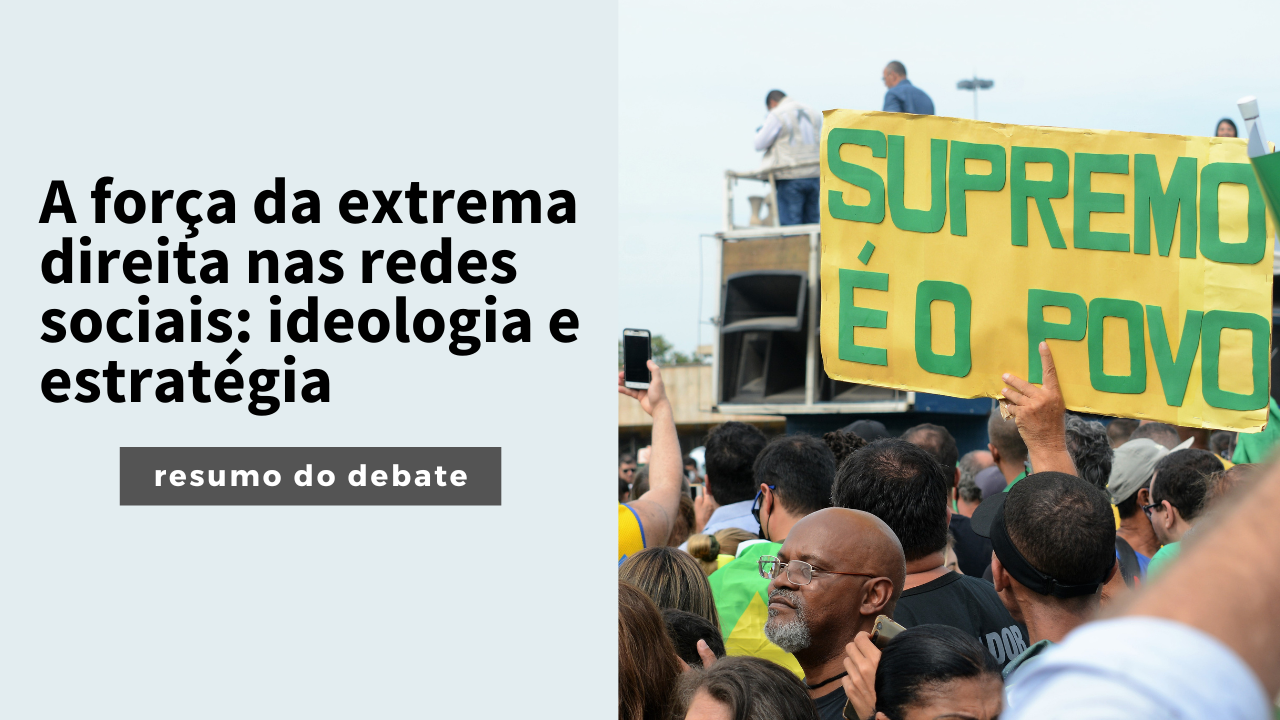Social media is a propitious space for constructing narratives that support the Brazilian far right, in general, and the Bolsonaro (bolsonarista) movement, in particular. The phenomenon occurs in several countries (and Brazil) and has been altering 21st-century politics. It is the subject of research by the Far Right Observatory (Observatório da Extrema Direita – OED), an initiative dedicated to monitoring and analyzing extreme-right governments, parties, and movements in Brazil and around the world.
“The far right has understood that giving simplified explanations for complex phenomena works in the digital environment. They are not afraid of making mistakes and experimenting, and they are reaping the fruits of what they began planting more than ten years ago,” said anthropologist Isabela Kalil, a professor at the Fundação Escola de Sociologia e Política de São Paulo (FESPSP). Since the beginning of last decade, Kalil has been developing ethnographic research on public and internet protests.
“Bolsonarism speaks directly to the narratives of the North American, Polish, and Hungarian far right, and so on. What we often see here are translations of outside-constructed narratives, and vice-versa, because Brazilian production is very active,” said political scientist Guilherme Casarões, professor at FGV-EAESP and researcher of Brazilian foreign policy, the far right, and religious nationalism.
Both are coordinators of the OED, a project started in 2019 by Professor of International Relations David Magalhães (PUC-SP/FAAP), which has grown in the last two years, gathering researchers from various universities and research institutions from Brazil and abroad. The FHC Foundation invited the Observatory to collaborate in putting together this webinar.
Far-right transnational networks
In his presentation, Casarões outlined how “far-right transnational networks” are coordinated and operated, summarizing four integrated steps:
1. Emulation: The reproduction of ideas, aesthetics, and performances of the global far right, especially the North American alt-right.
2. Adaptation: The translation of this set of symbols to Brazilian reality predicated on known Brazilian references.
3. Coordination: The stage that presupposes a degree of functional coordination between these groups and their members. For example, Bolsonaro supporters who are physicians that dialogue directly with Bolsonaro supporters who are digital influencers, etc.
4. Legitimation: Adherence through likes, retweets, etc., combined with internal corroboration and external validation. For example, Bolsonaro’s engagement with fake profiles and interactions that happen at transactional levels.
“I credit Olavo de Carvalho as the father of this Brazilian far-right. He was already blazing trails when social media began, helping to project these groups,” explained the researcher. The far-right groups consolidated themselves in sort of an internet underground, in discussion forums like 4chan and Reddit, and they gradually brought parts of these narratives to the surface. The following particularly stand out in Brazil:
- Interest groups: groups who do not necessarily operate natively in the digital realm but fills it with specific agendas. Examples include evangelicals, arms race enthusiasts, physicians, and business people with ties to Bolsonarism, who push agendas such as Christian moral values, freedom, and chloroquine, among others.
- Narrative creators: groups that systematically engage in creating narratives that support the far-right advocates in everyday politics, such as journalists and influencers.
- Shock troops: those who efficiently leverage and disseminate these narratives, primarily through the language of memes, games, etc.
The followers of Olavo de Carvalho (who died in 2022) created the codes, symbols, and performances that shaped what became known as Bolsonarism on social media. “Evangelicals are one of the bearers of this process. With Bolsonaro’s rise to the spotlight, some evangelical leaders sought to modulate their rhetoric and symbols to converge with what Bolsonarism was already doing,” argued Casarões. “I would not rule out the possibility that people very close to the government have certain centralized narratives,” he concluded.
Between the street and the internet: a case study of Bolsonaro-supporter networks
“The internet didn’t invent these micro-fascisms. But rethorics that were previously unacceptable in public and were somehow held within retaining walls gained visibility and gradually became tolerable on social media,” said Isabela Kalil.
The anthropologist explained that even relatively small street protests could yield material that is later amplified on social media and have a long-term impact. “Sometimes, the street movement may seem insignificant or meaningless, but we see images and content it produces that will feed digital platforms for years, in different contexts.”
Kalil brought a case study to the event: a protest in the early days of the novel coronavirus pandemic in Brazil, on March 15, 2020. It was supposed to be a large street demonstration, but due to the pandemic restrictions, it was more suited for digital photo ops. The agenda was also adapted. The original idea was to ask for a National Congress shut down. Instead, the protest focused on pandemic denial, conspiracy theories, and attacks on China.
“The internet is an open environment, accessible to anyone. However, these more radical groups use codes and passwords, which work like a key. Those who do not know the codes cannot identify what is happening,” she explained. As of March 15, 2020, the research tracked 30 hashtags – the # symbol used to index keywords or topics on Twitter.
“On that particular day, we found that 55% of the shares of the hashtag #BolsonaroDay were from what we call inauthentic behavior. In other words, robots and cyborgs were responsible for more than half of the engagement,” she explained. According to Isabela, this cannot be generalized, but it is paradigmatic, as it is the first in a series of so-called “anti-democratic acts”. “Robots don’t vote, but they can falsify public opinion, influence humans, and put us at risk,” she said.
“Events continue being scheduled to this day, now with Bolsonaro’s so-called ‘motociatas’ (Portuguese for a procession of bikers), also important for creating photo ops and digital mobilization. It is a Bolsonaro-supporter political technology, and it has been perfected.
These radical conservative groups’ ideology and strategies represent a major challenge for the left, which has yet to find a way to counter the far right’s social media strength.
“The progressive field, as I prefer to call it, tries to convince with ideas, while the far right mobilizes affections and instigates fear, hatred, and prejudice,” she added. According to the anthropologist, there are more pedagogical and effective ways that the progressive field could use to have better social media dialogue with the public, especially the younger audiences, who have been increasingly attracted by the far right’s reactionary discourse.
To complicate matters further, the far right is adept at making the left “work for free” to its advantage in the virtual world. “When the far right uses a photo op and launches nonsense on social media channels, the progressives end up sharing it as criticism, which amplifies the chatter. The progressive field works for the far right for free all the time,” explained Kalil.
Isabel Penz is a historian who graduated from USP and serves as an assistant study and debate coordinator at the FHC Foundation.
Portuguese to English translation by Melissa Harkin, CT & Todd Harkin (Harkin Translations).











